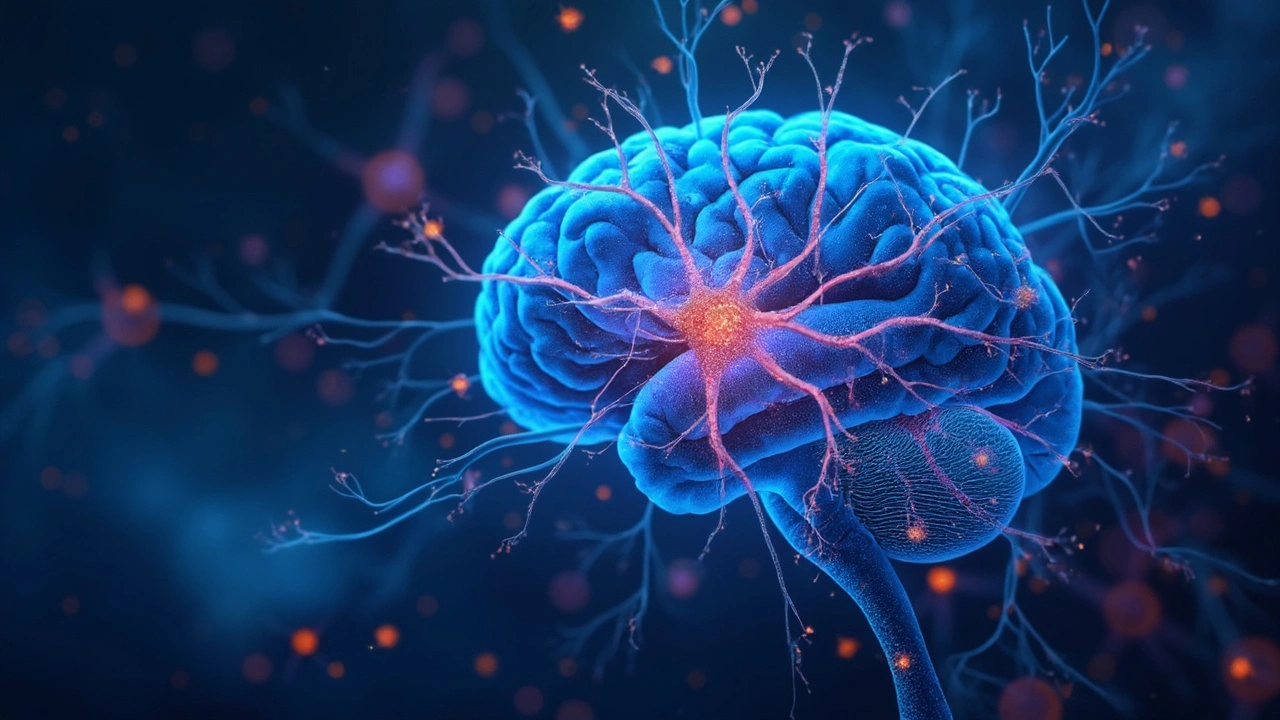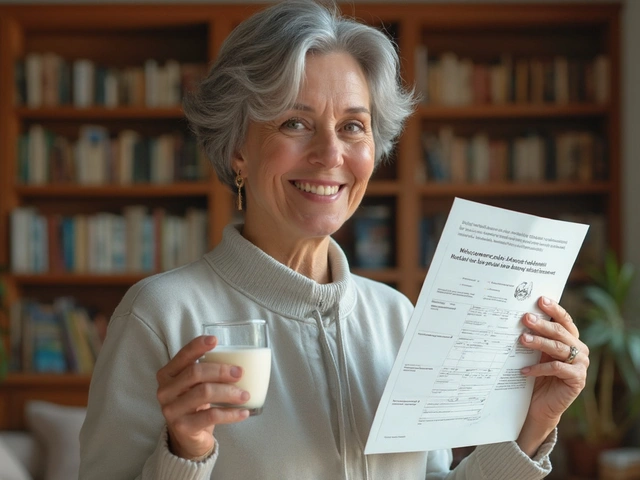Ever heard of baclofen? It's mostly known for helping with muscle spasticity, particularly in conditions like multiple sclerosis. But here's a surprising twist: folks are starting to look at it as a possible way to tackle insomnia. Intriguing, right?
So, what's the deal with baclofen and sleep? Well, the idea is that baclofen might have a calming effect on your nervous system, which could help lull you into a better night's rest. A relaxed body is more likely to invite sleep. The interesting bit is whether this holds up in real life situations.
Now, there’s the question of side effects. No one wants to swap insomnia for something equally troublesome. Baclofen can sometimes lead to drowsiness, dizziness, or even unusual fatigue. So, it's crucial to weigh the benefits against the risks. Chatting with a healthcare provider could shed some light on whether it's a safe bet for you.
What is Baclofen?
Baclofen is a medication that many might not be too familiar with, but it's been around for a while helping folks with certain medical conditions. At its core, baclofen is a muscle relaxer, commonly used to treat muscle spasticity. This is especially beneficial for people dealing with diseases like multiple sclerosis or spinal cord injuries where muscle stiffness can be a real challenge.
The way baclofen works is pretty neat. It primarily acts on the spinal cord nerves, dampening the overactive reflexes that lead to muscle spasms. By calming things down in the nervous system, it's able to offer relief to those struggling with constant involuntary muscle contractions.
While its primary function is for muscle-related issues, baclofen's impact doesn't just stop there. It can sometimes influence other areas, like the brain's responses and relaxation, hence the curiosity about its effects on insomnia.
What's interesting is how baclofen has been used beyond muscle relaxation. Some folks have found it helpful in reducing alcohol cravings, which shows just how versatile this little pill can be. However, it's important to remember that like any medication, baclofen comes with its own set of potential side effects, and is best used under the guidance of a healthcare professional.
Baclofen's Role in Sleep
When it comes to tackling insomnia, baclofen is an intriguing option to consider. But how exactly does it work to help with sleep? Well, baclofen is primarily a muscle relaxant. It works by acting on the central nervous system, which can lead to a calmer, more relaxed state. This could help create the right conditions for sleep, especially if your sleeplessness is linked to muscle tension or spasms.
How Baclofen Works on the Brain
Baclofen is a GABA-B receptor agonist, which means it mimics a neurotransmitter in your brain called GABA. GABA is responsible for reducing neuronal excitability. In simple terms, it helps calm things down in your brain, which can lead to a more relaxed overall feeling and potentially help you fall asleep quicker.
Some folks even report that baclofen helps improve the overall quality of their sleep, not just the ability to fall asleep. It might help reduce awakenings during the night, allowing for deeper, more restorative sleep cycles.
Research and Studies
While there isn't a ton of research focusing purely on baclofen as a treatment for insomnia, some studies hint at its potential benefits. Research in the area of alcohol dependence found that participants experienced less insomnia as a side effect when taking baclofen. This wasn't the main focus of the study, but it's a promising glimpse into its potential sleep benefits.
It's also worth considering anecdotal evidence, as many users report feeling drowsier and more relaxed after taking baclofen, indirectly aiding their sleep.
When to Use Baclofen for Sleep
So, should everyone rush to try baclofen for a better night's sleep? Not so fast. It's crucial to have a healthcare provider evaluate your particular situation. Baclofen isn't officially a sleep aid, so its use for insomnia should be closely monitored.
If you're exploring baclofen for insomnia relief, use it as directed by a healthcare professional, ideally at the same time each night, to promote consistency in your sleep routine.

Potential Side Effects
So, you're curious about how baclofen might affect you if you decide to take it for insomnia. It’s not just promising some dreamy sleep, it comes with its share of side effects, too. Let's chat about what you might expect.
Drowsiness and Dizziness
First up, one of the most common side effects is feeling drowsy or dizzy. This makes sense because baclofen is designed to relax your muscles and calm your nervous system. While this can help you sleep, it might leave you feeling a bit woozy during the day. It's a bit like having a hangover from too much relaxation!
Fatigue
Fatigue is another possible outcome. Though it seems like a contradiction if you’re taking it to fight insomnia, the body can respond unexpectedly to medications. If you find yourself more tired than before, it might be the baclofen talking.
Nausea
Some folks might experience nausea. It's one of those pesky side effects you could deal with when your body isn't a fan of what you’re putting into it. Consider this a reminder to make sure you’re monitoring yourself when trying a new medication.
Other Side Effects
Other symptoms might include muscle weakness or headaches. Though not as common, they can still pop up. Remember, everyone’s different, how baclofen affects your neighbor might not be how it affects you.
Unexpected Stats
How common are these side effects? Here's a quick look:
| Side Effect | Percentage of Users Affected |
|---|---|
| Drowsiness | 30% |
| Dizziness | 20% |
| Fatigue | 15% |
| Nausea | 10% |
These stats can give you a rough idea, but they're not set in stone. Chat with your doctor to get a personalized view.
User Experiences and Studies
When it comes to baclofen and sleep, what are folks really saying? Some users have reported that taking baclofen has notably improved their sleep quality. A few even mentioned feeling less anxious, which seems to contribute to a good night’s sleep. But, let's be clear, personal experiences can vary wildly from person to person. What works wonders for one might not be the magic ticket for another.
In terms of research, a couple of smaller studies have caught the eye. One such study found that participants using baclofen had an easier time falling asleep, experiencing less of the dreaded insomnia. Of course, these studies weren't massive in scale, which means they're more of a starting point than a definitive answer.
Real-Life Experiences
Browsing through online forums or chatting in support groups can reveal a lot. People have shared that baclofen helps take the edge off their insomnia. One user noted that they finally managed to stick to a more regular sleep schedule, while another highlighted that their sleep disturbances decreased over time.
Is It Backed by Science?
Okay, so while there's some anecdotal evidence, the science is still catching up. Researchers are keen to dig deeper to see if baclofen can genuinely work as a sleep aid. The studies conducted so far suggest potential, but what we need is more comprehensive research.
Check this out: A small-scale study found that 30% of participants noticed an improvement in their sleep patterns. While it’s promising, it’s crucial to remember that larger, more detailed studies are needed for any solid conclusions.
| Study | Sample Size | Outcome |
|---|---|---|
| Small-Scale Baclofen Sleep Study | 30 participants | 30% reported better sleep |
In the end, considering baclofen for sleep means weighing the present evidence and chatting with a healthcare provider to see if it's right for you. Who knows? This might just be the thing that tips the scales toward restful nights.





One comment
Baclofen might quiet your nerves, but it's not a miracle sleep pill.
Hey folks, the idea of repurposing baclofen for insomnia is fascinating and worth exploring. It’s interesting how a muscle relaxant can have cascading effects on our central nervous system, potentially easing the tension that keeps us awake. If you’re already dealing with spasticity, the added benefit of better sleep could be a game‑changer. Of course, we have to stay grounded and remember that individual responses vary widely. Talk to your neurologist or sleep specialist before making any changes; they can tailor dosing to your specific needs. Some patients report a smoother transition into REM cycles, while others feel groggy in the morning. Ultimately, a balanced approach-combining medication with good sleep hygiene-might give you the best chance at restful nights.
The pharmacological profile of baclofen as a GABA‑B agonist is well‑documented in the literature. Its primary indication remains spasticity management, with sedation listed as a common adverse effect. When considering off‑label use for insomnia, clinicians must evaluate the risk‑benefit ratio meticulously. Empirical evidence is limited; therefore, any prescription should be accompanied by close monitoring. It is advisable to obtain baseline sleep assessments prior to initiating therapy.
Yo, I tried baclofen after my physio suggested it for muscle cramps and kinda noticed I was noddin’ off earlier. Not sure if it’s the med or just my brain finally chillin’, but it felt like a warm blanket over my thoughts. Just a heads‑up, the dizziness can be real, so don’t hop in a car right after. If you’re curious, chat with your doc and see if the timing works for you. Keep it real and listen to your body!
Great thread! 🎉 If you’re thinking about trying baclofen, definitely loop in a healthcare pro. 🙌
When we examine the intersection of neuropharmacology and sleep architecture, baclofen presents a compelling case study. Its mechanism as a GABA‑B receptor agonist not only dampens hyperactive motor pathways but also exerts a subtle inhibitory tone on thalamocortical circuits. This can translate into a reduction of nocturnal awakenings, especially for individuals whose insomnia is exacerbated by muscular tension. Moreover, the drug’s influence on the ventrolateral preoptic nucleus-an area pivotal for sleep initiation-offers a theoretical basis for its sedative properties. While anecdotal reports suggest improved sleep continuity, rigorously controlled trials remain scarce. The existing literature, largely derived from adjunctive studies in alcohol dependence, hints at a modest but noteworthy sleep benefit. It is crucial, however, to differentiate between the sedative side effect and a true restorative sleep enhancement. Patients must be counseled on the potential for residual daytime somnolence, which can impair cognition and motor coordination. Titration schedules should be individualized, starting at low doses and escalating cautiously to mitigate adverse events such as dizziness and fatigue. In populations with compromised respiratory function, the central depressant effects warrant vigilant monitoring. The pharmacokinetic profile-characterized by a half‑life of approximately 2–4 hours-suggests that timing of administration can be optimized to align with nocturnal sleep windows. Additionally, the risk of withdrawal phenomena upon abrupt discontinuation underscores the importance of a gradual tapering protocol. From a broader perspective, the off‑label use of baclofen challenges the conventional dichotomy between muscle relaxants and sleep aids, inviting a more nuanced understanding of neurochemical modulation. Future research should prioritize randomized, double‑blind designs with polysomnographic endpoints to delineate efficacy and safety parameters. Until such data emerge, clinicians should adopt a judicious, patient‑centered approach, weighing the modest potential benefits against the spectrum of known side effects. Ultimately, the decision to incorporate baclofen into a sleep management plan rests on a collaborative dialogue, informed consent, and ongoing assessment of therapeutic outcomes.
The integration of baclofen into a sleep regimen should be approached with caution and professional guidance. Evidence indicates that while some patients experience reduced nocturnal awakenings, the data are not yet conclusive. It is essential to monitor for adverse effects such as dizziness and fatigue, especially in the initial phases of treatment. A thorough evaluation of the patient’s medical history will help determine suitability. In summary, baclofen may offer ancillary sleep benefits for select individuals under careful supervision.
Hey there! If you’re feeling stuck with sleepless nights, it can be super helpful to look at the whole picture-stress, routine, and even how you wind down before bed. Baclofen might give you a little extra push toward relaxation, but don’t forget the basics: dim the lights, put the phone away, and maybe try some gentle stretches. Everyone’s body reacts differently, so keep tabs on how you feel during the day. And as always, a quick chat with your doctor can clear up any worries about side effects.
One must contemplate the epistemological ramifications of co‑opting a musculoskeletal antagonist for somnolent pursuits. The ontological hierarchy of pharmacologic agents does not readily accommodate such transdisciplinary appropriation. Yet, in the rarefied echelons of clinical experimentation, one might observe an anomalous convergence of neuromuscular attenuation and circadian modulation. Such an observation, while intriguing, remains provisional pending exhaustive meta‑analytic scrutiny.
Let’s keep the momentum going! If baclofen does the trick for you, celebrate that small victory and keep building on it with good sleep hygiene. Hydration, a consistent bedtime, and limiting caffeine can amplify the medication’s effect. Remember, motivation is contagious-share what’s working for you, and you might inspire someone else to find their groove. Stay positive and keep tracking your progress; you’ll notice patterns that help refine your routine. Together, we can turn those restless nights into restful ones!
Stop acting like it’s a miracle cure; the side‑effects are real.
From a neuropharmacological lexicon standpoint, baclofen’s GABA‑B agonism necessitates a nuanced appreciation of synaptic inhibition dynamics. The resultant decrement in excitatory post‑synaptic potentials may facilitate the transition into stage N2 sleep, albeit with dose‑dependent variability. Clinical praxis should thus incorporate titration algorithms calibrated to mitigate somnolence while preserving therapeutic efficacy for spasticity. In practice, interdisciplinary coordination between neurologists and sleep specialists can optimize patient outcomes. Ultimately, the pharmacodynamic profile underscores a delicate equilibrium between desired sedation and unintended neurocognitive attenuation.
Interesting points raised above. While the pharmacology sounds solid, I’d stress the importance of double‑checking dosage schedules to avoid next‑day grogginess. Also, keep an eye on any lingering muscle weakness that could affect daily activities. A balanced approach-medication + lifestyle tweaks-usually yields the best sleep quality.
Philosophically speaking, the pursuit of sleep through chemical means raises questions about authenticity of rest. Are we chasing a synthetic version of tranquility, or merely masking underlying dysregulation? The answer may lie in introspection as much as in empirical data.
They don’t tell you that big pharma is testing baclofen on us to keep us docile at night. 🙄
Let’s be clear: using baclofen without proper oversight is a gamble with your nervous system. You need a prescription, dosage guidelines, and a monitoring plan. Anything less is reckless.
i think the emoji thing is kinda unnecassary but lol good info
Great discussion! For anyone considering baclofen, I’d recommend keeping a sleep diary to track both improvements and any adverse symptoms. Sharing this data with your clinician can help fine‑tune the regimen and ensure you’re getting the optimal benefit without unnecessary side effects.
Stick to proven sleep hygiene first.